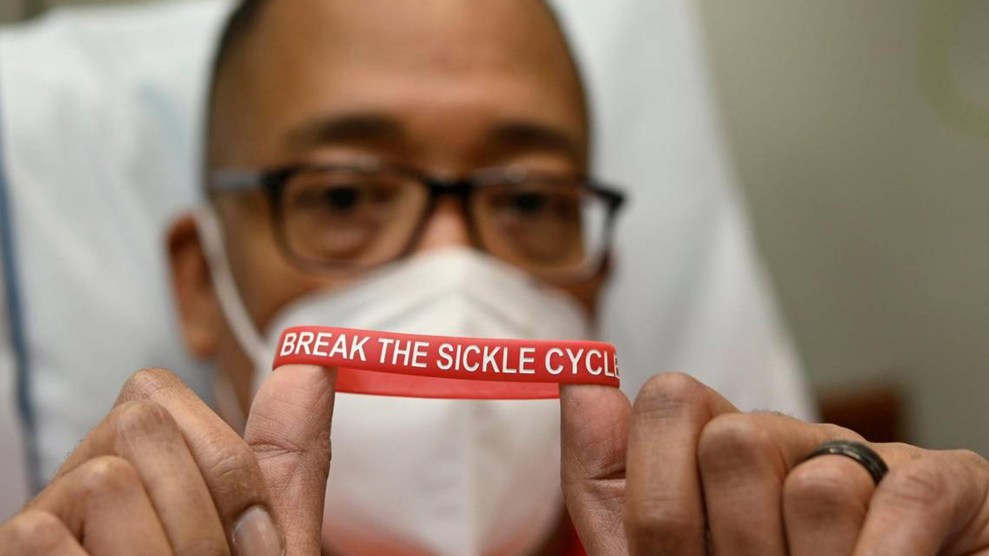
Tammy Ljungblad/The Kansas City Star/Tribune News Service/Getty
In June 2019, California Gov. Gavin Newsom signed the state’s annual budget into law—which that year included around $15 million (of some $215 billion total) to create and fund a statewide network of treatment centers for sickle cell disease, with training for health workers and improved diagnostic screening.
Sickle cell disease, a group of rare genetic disorders characterized by abnormal hemoglobin, can be very painful, cause reduced life expectancy, and involve complications like severe anemia. Research and treatment for sickle cell disease, which primarily affects Black and Latino people in the United States, has been largely underfunded in comparison to other rare genetic conditions like cystic fibrosis and hemophilia, which are more common in white people.
Networking California for Sickle Cell Care (NCSCC) has since established 12 clinics across the state—serving nearly a thousand patients. “We were very grateful and thankful,” said Jennifer Fields, a strategist who worked on the plan and lives with sickle-cell. “I was very hopeful that more progress would be made, not only in California, but across the nation.”
That initial funding has been stretched past the three years it was originally meant for. Early data, the network says, shows that it has reduced emergency treatment for sickle cell by 11 percent statewide, and hospitalizations by 20 percent. Fields and other advocates hope to see the state invest at least a further $10 million to continue NCSCC’s work and integrate it with a wider overhaul of the state’s health care systems. But the NCSCC wasn’t part of California’s last budget—or its current one—and it’s not clear why.
The lack of transparency isn’t new: The state’s Legislative Analyst’s Office has previously called for more transparency in healthcare spending decisions. In recent years, Gov. Newsom has been steering healthcare funding into forced mental health treatment and toward the state’s troubled diversionary court system for mental health and substance abuse—which some experts contend strips people with mental illnesses of their rights and creates mistrust in populations it’s supposed to serve.
“The biggest factor in the prognosis of sickle cell disease is lack of care: lack of access to specialty care and lack of access to primary care,” said Dr. Elliott Vichinsky, a University of California, San Francisco pediatric hematologist-oncologist who has worked with sickle cell patients for decades.
Both federally and in California, governments didn’t begin to fund robust sickle cell treatment until community-led campaigns raised awareness. As academic and former Office of Science and Technology Policy official Alondra Nelson writes in her 2011 book Body and Soul, a 1972 nationwide public health campaign by the Black Panther Party “strategically reworked earlier and often racially essentialist associations between sickling and blackness” that harmed patients with sickle cell disease.
Medical racism still shapes how sickle cell patients are treated, like being labeled as “drug-seeking” for trying to get help to treat their pain, a symptom that’s not only inherently harmful but signals other internal issues caused by the condition. “Pain of the patients reflects obstruction of blood flow of an area that has nerve endings,” Dr. Vichinsky said.
Patients without access to providers who understand sickle cell disease may not be prescribed valuable medications like hydroxyurea, which can address several complications. Clinicians familiar with the disease could be more alert to when a patient may need a blood transfusion, and to which patients could benefit from stem cell transplants—which may be able to cure the condition, but aren’t risk-free, as donated stem cells can mistakenly attack the recipient.
While the FDA recently approved two groundbreaking gene therapies for sickle-cell, not everyone is physically a good candidate for these treatments, and they can cause devastating side effects like infertility. Long-term longitudinal studies, which can be crucial in building trust with patient communities, are still needed for gene therapy and sickle cell disease. And with patient costs exceeding $2 million, gene therapy can be out of reach for people on governmental insurance. The CDC estimates that in California, from 2014 to 2016, around two-thirds of people with sickle cell were at some point on Medicaid.
As the program helps treat a long-disregarded rare disease, advocacy for sickle-cell care requires allies to make noise, including in the legislature.
“We hope to see policymakers not just pay a little bit of lip service and talk about addressing health inequities,” Fields said, but to “show their support by continuing to invest.”

















